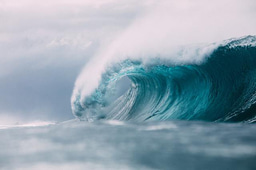Gatekeeping, Power Hoarding and Inclusivity in Conservation- Professional Insights from Elizabeth’s Experience.

Meet Elizabeth La Rue -
If there were a superhero for conservation, Elizabeth Silleck La Rue, Esq. would surely wear the cape! With over 25 years of championing environmental conservation and social justice, Elizabeth has turned policy advocacy, sustainable fisheries management, and ocean conservation into her playground of impact. As the CEO of Silleck Consulting Services, she’s not just leading the charge but also empowering nonprofits and government teams to navigate conservation challenges with her treasure trove of expertise.
In this interview, Elizabeth offers a unique and candid perspective on the issues of gatekeeping and power hoarding. Through her experience, she sheds light on the barriers that limit inclusion in environmental efforts and how these barriers can be dismantled for greater equity and sustainability. Drawing from her professional journey, Elizabeth addresses the critical need to amplify marginalized voices in conservation, while also tackling misconceptions about marine conservation that could undermine efforts to protect our oceans.
In the fight to protect our natural environment, particularly our oceans, there are often significant barriers that prevent progress. Among these are the issues of gatekeeping, power hoarding, and the exclusion of marginalized communities from conservation efforts. This interview examines these difficulties and workable solutions to tackle them.
Inclusive Conservation Advocacy
Conservation efforts have long been associated with certain privileged communities, often leaving out the voices and concerns of marginalized groups who are most affected by environmental degradation.
Blessing: How do you ensure ocean conservation work is inclusive?
Elizabeth shared her commitment to equity as a central component of her work. She emphasized that she only engages in initiatives that are intentional about inclusivity and equity within conservation policy and programming. As she stated,
I don't work on conservation initiatives anymore that solely focus on the impact on the environment without assessing their work through the lens of equitable distribution of resources and the equitable burdens of environmental degradation. This principle is stated on my website: equitable conservation policy, with equity coming first. This is how I ensure that, in my work and in the work of the people I team with, everything is always designed around equity.
For Elizabeth, ensuring inclusivity starts with the communities that have been historically excluded from the conversation. She highlighted the importance of involving marginalized groups from the very beginning of any conservation effort. She said,
You can't go to the people who have been most harmed and excluded in the past as an afterthought, which unfortunately still tends to happen. We need to engage with those who have been marginalized, listen to their experiences, and work to repair the harm caused by that exclusion. It’s essential to build trust and amplify the needs of those who have not been included in the past.
Gatekeeping and Power Hoarding in Conservation
I think gatekeeping and powerhoarding are not unique to the conservation sector.
Elizabeth stated as she elaborated that they are fundamental to the systemic structure of most societies being governed by people with power and resources.
Elizabeth: “It shows up in the conservation sector, with people being very protective and exclusionary when it comes to relationships with other people who have power, and relationships with people who have resources. There is active resistance to providing access to those people who have the power to determine important outcomes and who manage large amounts of money. There are people in the conservation field who build their entire careers off of the existence of networks—networks of the people who have power and resources—and they don't have a lot of subject matter expertise around conservation.”
Elizabeth shared that gatekeeping leads to exclusion and ultimately impedes progress toward equitable and sustainable environmental systems. She argued that this creates competition rather than collaboration, resulting in a perpetuation of the status quo where power and resources are hoarded by a select few.
When asked about the root causes of gatekeeping, Elizabeth pointed to the scarcity mindset:
The idea that power is scarce, resources are scarce, and competition is the way that you make sure you come out on top.
She believes this mentality is the driving force behind much of the conflict and inequality in society, including in the conservation sector.
Elizabeth has experienced gatekeeping firsthand during her work as a marine conservationist and fundraiser. She recalls a particular instance where she was working on a contract funded by a prominent foundation. Despite her role, one individual from the foundation made it nearly impossible for her to do her job effectively. They blocked her from establishing key relationships and wanted to control who received credit for the success of the project.
It was very frustrating and counterproductive because my part was to form relationships with people exactly like the person that I was inhibited from contacting. So I ended up declining to continue working on that project for as long as I had originally envisioned because the work was being inhibited by the gatekeeping function of the foundation.
Dismantling Gatekeeping Practices
As for solutions, Elizabeth was candid in admitting that there is no easy fix to dismantling gatekeeping and power hoarding. However, she shared her approach:
I do my best in my little sphere of influence to open up opportunities for younger people and lesser-known individuals that are not already getting a lot of accolades in the conservation field but are doing tangible conservation work on the ground.
She emphasized the importance of using one's platform to amplify the voices of those who are often excluded from mainstream conservation discussions. One of her initiatives is a mini-documentary series, "Fins in the Water," which highlights the work of coral restoration volunteers—individuals who invest their time and resources into conservation without receiving the recognition they deserve. For Elizabeth, uplifting these voices is a crucial step toward breaking down the barriers created by gatekeeping.
Misconceptions in Marine Conservation
Elizabeth also addressed several misconceptions about marine conservation. One common misconception, she noted, is that all marine conservationists are anti-fishing. She clarified that many people working in marine conservation come from fishing backgrounds and are not opposed to sustainable fishing practices.
There are a lot of people who work in marine conservation who come from fishing backgrounds, and they bring important data and experience to conservation efforts.
Another misconception she highlighted is the belief that ocean conservation is predominantly carried out by white men. In reality, Elizabeth pointed out that a significant portion of marine conservation work is done by women, many of whom are from diverse racial backgrounds at the international scale. However, these individuals often do not receive the same recognition or funding as their male counterparts.
Lastly, Elizabeth discussed the misconception that the ocean, and specifically coral reefs, are doomed. She pushed back against this narrative, arguing that it is both inaccurate and harmful.
Humans are not God, she said. We can’t sit here and say that there’s no future for coral. That kind of messaging is certainly not going to mobilize people to do the work that needs to be done to prevent catastrophe.
Instead, she believes that with proper conservation efforts, there is still hope for coral reefs and the oceans.
Key Takeaways:
Conservation should not only benefit those who have historically had access to power and resources. For real change, we must center those who have been historically excluded and harmed by it.
The scarcity mindset is a huge root cause of gatekeeping. People tend to think resources and power are limited, so they must hold on to them tightly, which prevents access for others.
It is hard to dismantle gatekeeping on a global scale, but I can focus on using my sphere of influence to uplift those who are less well-known and highlight the work of people on the ground.
Again, a huge THANK YOU to Elizabeth Silleck La Rue for delivering this deep wealth of wisdom, knowledge, and experience!





Please sign in or register for FREE
If you are a registered user on WildHub, please sign in
Wow, this is inspiring! Thanks so much for all the work that has gone into this. Really enjoyable and informative read and lots to consider.